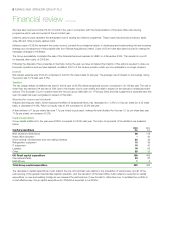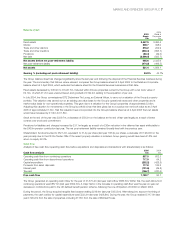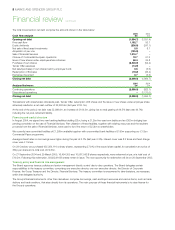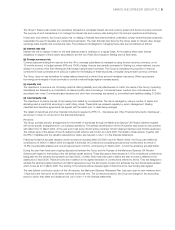Marks and Spencer 2005 Annual Report Download - page 18
Download and view the complete annual report
Please find page 18 of the 2005 Marks and Spencer annual report below. You can navigate through the pages in the report by either clicking on the pages listed below, or by using the keyword search tool below to find specific information within the annual report.
16 MARKS AND SPENCER GROUP PLC
Remuneration report
Compliance
The Remuneration Committee has adopted the principles of good
governance relating to directors’ remuneration as set out in the
new Combined Code. This report complies with the Companies
Act 1985, as amended by the Directors’ Remuneration Report
Regulations 2002 and the Listing Rules of the Financial Services
Authority.
Part 1: Unaudited Information
Remuneration Committee
With effect from 15 July 2004, the Committee comprises Jack
Keenan (Chairman), Anthony Habgood, Steven Holliday and Kevin
Lomax, all of whom are independent, non-executive directors.
Dame Stella Rimington and Brian Baldock were members of the
Committee until they left the Company on 14 July 2004 and
Barbara Cassani, until she left the Company on 30 April 2004.
There were six meetings of the Remuneration Committee during
the period under review and all individuals who were a member of
the Committee at that time attended the meetings, with the
exception of Barbara Cassani, who did not attend the meeting on
21 April 2004. The Committee recommends to the Board the
remuneration framework to allow the Company to attract and
retain its executive directors and senior management, giving due
regard to the financial and commercial health of the Company. In
addition, the Committee is responsible for setting the remuneration
for the Chairman. The Committee’s approach reflects the
Company’s overall philosophy that all employees should be
appropriately and competitively rewarded, in particular to recognise
that the highest standards of performance deliver improved
business results.
The Committee keeps itself fully informed of all relevant
developments and best practice in the field of remuneration and
seeks advice where appropriate from external advisors. New
Bridge Street Consultants LLP have provided material advice to
the Committee and the Company on directors’ remuneration and
share schemes in the past year, in particular the role and shape of
the incentive schemes.
The Company Chairman, Chief Executive, Group Secretary and
Head of Senior Remuneration also materially assisted the
Committee in its deliberations, except in relation to their own
remuneration.
Remuneration policy
Marks & Spencer depends upon the skill and experience of
motivated employees throughout all levels of the business. It is part
of our strategy to have a range of schemes to attract, motivate
and retain high calibre individuals to drive the Company’s recovery
and deliver improved performance. The Board considers the
principles of good governance when deciding the remuneration
strategy, and recognises that the level of remuneration and benefits
we offer is key to supporting this objective and maintaining our
market position as an employer of choice.
Total remuneration for executive directors comprises base pay,
variable pay, pension and benefits. Base pay and benefits are set
having regard to market practice and levels paid by similar
companies. Variable pay provides the opportunity to earn greater
amounts for the highest standards of performance. The
performance-related element forms a significant proportion of the
total potential package.
During the year, the Remuneration Committee has undertaken a
comprehensive review of the remuneration policy, and in particular
the role of variable pay. Following this review, the Company is
proposing to make changes to the bonus and share incentive
arrangements. Shareholder approval will be sought for a new
Performance Share Plan and a new Executive Share Option Plan.
Full details of both these Plans are contained in the Notice of
Meeting.
In summary, the proposals are:
•To enhance annual bonus potential for approximately
400 of the more senior executives. Payment will require
the satisfaction of stretching targets and a significant
proportion of the bonus payable will be deferred into shares
for three years;
•To adopt a new Performance Share Plan as the Company’s
primary long-term incentive arrangement. It is intended to
make awards under this Plan to approximately 100 of the most
senior executives. Vesting of these awards will be based on
demanding earnings per share growth targets;
•To adopt a new Executive Share Option Scheme to be used
by the Remuneration Committee upon recruitment or in
exceptional circumstances, if it considers it appropriate
to do so; and
•To make no further awards under the Company’s Share
Matching Plan.
The proposals have been designed to rebalance the remuneration
package by weighting variable pay more towards annual
performance. To receive awards, executives will be required to
achieve demanding targets under the annual and long-term
arrangements, with the focus on targets that are most relevant
to them.
The proposals will use substantially fewer shares than the current
arrangements, resulting in a lower cost to the Company at target
performance than is currently the case, and only results in
additional cost at high levels of performance.
Expected proportions of future annual remuneration
package for executive directors
The value placed on long-term incentives assumes ‘on-target’
performance and comprises the expected cash value to executives
after three years, discounted back to its present value, of i) bonus
compulsorily deferred into shares and ii) performance shares
awarded under the Performance Share Plan.
Chairman’s and non-executive directors’ remuneration
The remuneration for the non-executive directors is determined by
the Chairman and executive directors and is designed to recognise
both the responsibilities of non-executive directors and to attract
individuals with the necessary skills and experience to contribute to
the future growth of the Company. The non-executives are paid a
basic fee with additional fees payable for committee membership
and to the chair of the committees. These fees are neither
Long-term
incentives
35%
On-target
annual cash
bonus
13%
Pension
9%
Salary
43%
Performance-relatedFixed
























